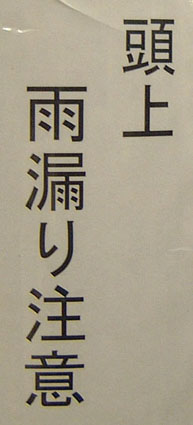Ama-mori
Ama-mori is a native Japanese word, a compound
consisting of ame 'rain' (here modified to ama)
and mori, from the verb moru
meaning 'to leak'. The meaning is 'a leak' of the kind that occurs in a building
or shelter when it rains.
Ama-mori is written   in
Chinese characters. This is how it is written in this temporary sign at a railway
station: in
Chinese characters. This is how it is written in this temporary sign at a railway
station:
 Zu-jō ama-mori chūi
Zu-jō ama-mori chūi
Be careful of leaking overhead |
At another station, mori had been simplified to
hiragana as   ,
another example of a native Japanese verb being written in hiragana
in preference to kanji. One reason for this is the relative complexity
of the character ,
another example of a native Japanese verb being written in hiragana
in preference to kanji. One reason for this is the relative complexity
of the character  .
This is the sort of character that people readily recognise but may occasionally
be unable to recall if they have to write it on the spur of the moment. .
This is the sort of character that people readily recognise but may occasionally
be unable to recall if they have to write it on the spur of the moment.

|
Ama-mori no tame, go-meiwaku
o-kake itashimasu
Ekichō
We apologise for the inconvenience caused by leaking.
Station master |
A Google search in September 2003 revealed the following pattern for ama-mori:
Note that the preferred usage is kanji first ( ),
followed by kanji or hiragana ( ),
followed by kanji or hiragana ( or
or  ). This
top-heavy arrangement is preferred. The opposite arrangement, the bottom-heavy ). This
top-heavy arrangement is preferred. The opposite arrangement, the bottom-heavy
  ,
is virtually non-existent. See also Akasuri. ,
is virtually non-existent. See also Akasuri.
| 
